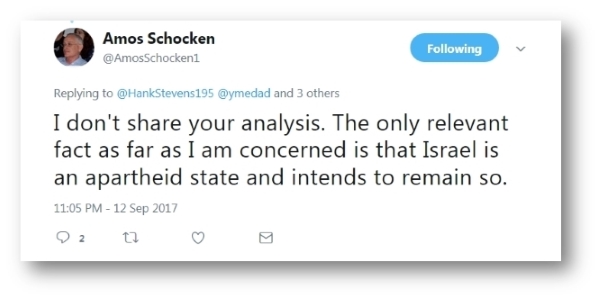Ha’aretz, the voice of Israel’s Left, published an editorial just before Yom Kippur, whose intent was to frighten those who oppose dismantling Jewish communities in Judea and Samaria and establishing a state of Palestine there. It’s worth a close examination, because there are still those, especially outside of Israel, who might take it seriously. Here it is in its entirety, with my comments:
Advocates of a two-state solution – in other words, a majority in Israel and throughout the world, or nearly so – cannot be unmoved and helpless in the face of its accelerated death spiral, in plain sight, under the irresponsible leadership of Prime Minister Benjamin Netanyahu.
Israelis have from time to time answered “yes” to questions like “If it would bring peace and security, would you support a withdrawal from the territories and the establishment of a Palestinian state.” But at the same time, a large majority believes that it would bring, instead of peace and security, a hostile terror state next door which would be a platform for attacks on Israel’s population centers. Ha’aretz deliberately misleads – lies – when it asserts that Israelis favor it.
The defense of Israel requires the presence of the IDF in the Jordan Valley and on the high ground of Judea and Samaria. No agreement for a demilitarized Palestinian state or for international guarantees can replace it. The example of Gaza shows that only Israeli military control can prevent the creation of a base for terrorism in view of Tel Aviv and Ben-Gurion airport. Ha’aretz doesn’t address the security issues at all.
It is also important to note the ambiguity in the phrase “two-state solution.” For Israelis, it means the establishment of a peaceful Palestinian state in the territories. For the PLO, it means the establishment of a Jew-free Palestine in the territories and the “return” of millions of descendants of Arab refugees to Israel. It does not imply an end of the conflict until all their demands are met.
This is a serious blind spot in the vision of the two-staters. All one has to do is listen to the pronouncements of the PLO, look at their schoolbooks, or study the results of polls taken in the PA to know that the Palestinian leadership and street are not interested in a peaceful state alongside Israel.
Palestinian President Mahmoud Abbas warned 10 days ago, in his speech to the United Nations General Assembly, of the momentous change taking place before our eyes. It was the first time Abbas addressed in detail the remaining option open to the Palestinians – to declare a new struggle, for equal rights throughout the territory of Israel-Palestine – in other words, a one-state solution.
Here Ha’aretz creates a false dichotomy. It is by no means the only “remaining option,” regardless of what Abbas might “declare.” But such a declaration would mark the end of the strategy, a modified version of Arafat’s 1974 “phased plan,” to establish a temporary “authority” on territory “liberated” from the Jews as an interim stage in the destruction of the Jewish state. As such, I would welcome it as a more honest approach to their true objective.
The threat of “one state with equal rights from the river to the sea” which would be perhaps 40% Arab (or a majority if Gaza were included), has been made before. Sari Nusseibeh proposed it years ago. But there are alternatives to “one state” other than creating a sovereign state of Palestine. One is that Israel annex the parts of Judea and Samaria that contain most of the Jewish residents and are strategic for the purposes of security, grant the Arabs autonomy in the remaining areas, but retain control of borders and airspace. Another is Martin Sherman’s plan to encourage Arab emigration with financial incentives. There is also a plan proposed by Mordechai Kedar to create “emirates” based on Palestinian clans, a logical solution considering Palestinian politics.
Incidentally, “Israel-Palestine” is not a place. There is no state of Palestine – there is an semi-autonomous Palestinian Authority in part of the territories, which was created by the Oslo Accords, which have long since been abrogated by the PLO. The pollution of language by advocates for a Palestinian state – i.e., the use of the phrases “State of Palestine” and “Israel-Palestine” to suggest that there already is such a state – must be rejected in the interest of truth.
Thus spake Abbas: “[N]either you, nor we, will have any other choice but to continue the struggle and demand full, equal rights for all inhabitants of historic Palestine.”
“Thus spake” the guy whose authority extends more or less to the city limits of Ramallah and who is hated by a majority of Palestinian Arabs. Abbas, a holocaust-denier, an inciter of murder and apologist for terrorism, is not a prophet who “spake” about anything, ever.
Not a week went by before Netanyahu provided the ultimate proof of Abbas’ argument. In his speech at the state Ceremony Marking 50 Years of Settlement in Judea, Samaria, the Golan Heights and the Jordan Valley, held in Gush Etzion he said, “There will be no more uprooting of communities in the Land of Israel!” In other words, there will be no additional evacuations of settlements, a declaration meaning the end of the chance for a two-state solution, which is based on the simple, fair formula of land in exchange for peace.
The formula of “land for peace” is neither simple nor fair. Not simple, because land, once given, can’t easily be taken back. Why should the other side provide peace once it has the land? Ha’aretz ignores the fact that any agreement (e.g., for demilitarization) with Abbas or any similar dictator could immediately be abrogated by a successor regime – or the regime itself. Any treaty that Israel would get in return for a withdrawal that would endanger its life would depend on the good faith of those who have never acted in good faith, and who proudly admit it when they are speaking Arabic to their own people.
“Land for peace” is only fair on the assumption that the possession of Judea and Samaria by an Arab regime is justified in the first place. But that possession was the result of aggression by the Arab states in 1948, in which Jordan occupied land earmarked by the Mandate for a Jewish National Home. How did this illegal 19-year occupation in some way legitimize Jordan’s later gift of the land to the PLO? If I steal your property and give it to my brother, does he have a right to keep it?
From the beginning, the central goal of the settlement enterprise, which celebrated its 50th anniversary on Wednesday, was to frustrate the possibility of establishing a Palestinian state alongside Israel and destroy any hope of reaching a peace agreement with the Palestinian people.
This, too is wrong. The objective was to settle the historic land of Israel, for some in order to guarantee its security according to Zionist principles, and for others to fulfill the biblical mitzvah to settle the land. In neither case did the Palestinian Arabs have anything to do with it. But Ha’aretz dislikes both Zionism and religion.
This destructive objective could be within reach. Only the urgent and vigorous mobilization of all forces in Israel and the international community that want a strong and free Israel alongside an independent Palestinian state could avert the evil decree, in the words of the liturgy, and rescue the most logical, just and feasible solution for ending the occupation and obtaining peace.
Ha’aretz and friends often refer to “the occupation” and the need to “end it.” This is another example of linguistic pollution. The presence of the IDF east of the 1949 armistice line is not a belligerent occupation in the traditional sense, because there is no state that is occupied. It is true that the Israeli Supreme Court decided that the IDF should provide the inhabitants with all the rights and protections guaranteed to a population under occupation as specified in the Geneva Conventions, but this was in order to protect their rights, not to limit them – and explicitly not to define the situation as one of occupation.
An “independent Palestinian state” in Judea, Samaria and eastern Jerusalem (and Gaza?) would not be any more viable than today’s Palestinian Authority, and would be a deadly threat to the continued existence of Israel as a Jewish state. Of course this is precisely the intent of those who favor such a state and who also have an understanding of the strategic realities in play.
Those who do not understand, and who – out of misplaced “humanitarian” concerns – wish to bring it about, are supporting the creation of a state that is guaranteed to be undemocratic, corrupt, and racist. And they are bringing us closer to war, not peace.
In which category do we find the Ha’aretz editors?


